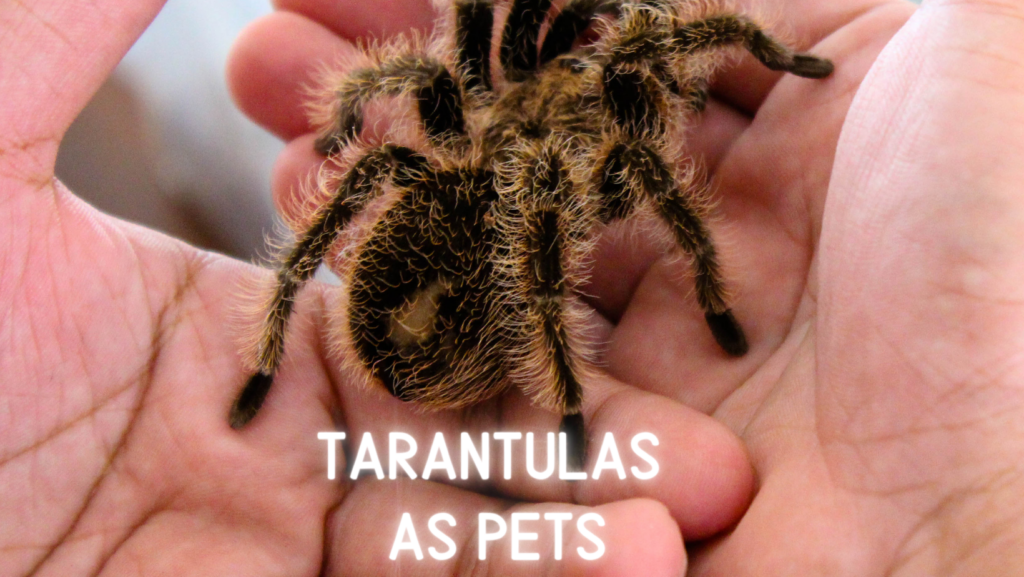Can You Own Tarantulas As Pet? Can Tarantulas be kept as pets? Some people carry fascinating that not everyone has. While people usually go for dogs, cats, rabbits, and fish as pets, there are individuals who go beyond the norm and bring home exotic pets, like Tarantulas.
Tarantulas make perfect pets for individuals who want to look further than regular domestic animals. By appearance, they may seem a little (or maybe a lot) intimidating, but in reality, they are pretty harmless. Like many other spiders, they too can bite; however, their bite is weaker than bees. Tarantulas are not for kids’ play, but adults can definitely possess them as pets.
However, remember Tarantulas are an ideal pet for you only if you handle them from a distance. They are spiders, and unlike dogs and cats, they may show zero interest in human affection and bonds. Before you bring them home, make sure you understand your responsibility as a spider pet owner.
Contents
- What is a Tarantula? Where do Tarantulas originate from?
- Tarantulas Species Taxonomy Chart
- Do Tarantulas make good pets?
- Can you have Tarantulas as pets?
- Is Tarantula legal to own in Canada?
- Are Tarantulas legal in the U.S.?
- Best Tarantula Species for owning as pets
- How much does a Tarantula cost?
- Where to buy a Tarantula? Where to find a Tarantula Breeder?
- Tarantula Housing Needs
- Tarantula Temperature and Humidity Needs
- Tarantula Dietary Needs
- Tarantula Cleaning Needs
- Common health problems with Tarantulas
- Advantages of owning a Tarantula
- Disadvantages of owning a Tarantula
- Frequently Asked Questions
- Wrapping up…
What is a Tarantula? Where do Tarantulas originate from?
A Tarantula is a large hairy spider that belongs to the family Theraphosidae. Currently, there are about 1010 Tarantula species, of which some have become popular as exotic pets.
Tarantula is native to different parts of the world, including tropical America, Mexico, the Southern United States, and Africa. In the Southern U.S., people know Tarantulas as Hairy Spiders, whereas, in Africa, they are known as Baboon Spiders.
A Tarantula spider can grow up to 5 cm (body length) up to 12.5 cm (leg span) and weigh no more than 3 ounces. It is dark in color and has hair all across its body, including its legs as well.
Tarantulas Origin: According to scientific research, tarantulas first emerged during the Cretaceous period, part of the massive supercontinent Gondwana. Today it is the region of America. Slowly, Tarantulas started spreading from America to Australia and Africa.
When the Gondwana continent broke apart, India collided with Asia and brought Tarantulas there as well.
Today, there are two Tarantulas fossils; one is from Mayanmar, whereas the other is from Mexico. The former is about 100 million years old, whereas the latter is 16 million years old.

Tarantulas Species Taxonomy Chart
| Name | Tarantula |
| Other Names | Spider, Hunting spider, Wolf spider, Hairy Spider |
| Scientific Names | Theraphosidae |
| Kingdom | Animalia |
| Phylum and Subphylum | Arthropoda and Chelicerata |
| Class | Arachnida |
| Order and Infraorder | Araneae and Mygalomorphae |
| Clade | Avicularioidea |
| Family | Theraphosidae |
| Size | up to 5 cm (body length) up to 12.5 cm (leg span) Weight 1 to 3 ounce |
| Lifespan | 15 to 25 years |
Do Tarantulas make good pets?
Tarantulas can make good pets, given the person (owner) is right. Keeping a tarantula is a serious responsibility and a job of high commitment. Since they live long, you will not lose them before 15 to 18 years.
Besides that, Tarantulas are easy to care for and require minimal maintenance. What makes them great pets is the fact that they will ask for a time even less than dogs and cats.
In addition to that, since Tarantulas do not bond with humans, you do not need to entertain them. The spider will live inside its enclosure, eat once or twice a week, and enjoy its own company.
However, if you are willing to own a pet whom you can hold, pet and cuddle, Tarantulas are definitely not the one for you.

Can you have Tarantulas as pets?
If you are wondering about possessing an exotic animal that is less dangerous and requires minimal human effort, there’s no better choice than Tarantulas for you.
What makes them incredible exotic pets is the fact that Tarantulas are extremely docile. However, before proceeding with the process, ensure exotic spiders are legal in your region.
Is Tarantula legal to own in Canada?
Canada has no regulations on possessing or owning spiders, including Tarantulas. Since they are not included in the definition of wildlife, one can definitely keep them at home as pets.
However, for transporting and travelling Tarantulas, one might have to learn about local laws in different parts of Canada.
Are Tarantulas legal in the U.S.?
Tarantulas are common in the United States, and even during the mating season, they have been known to wander into homes.
In their native regions, you can find Tarantulas across the human settlement, roaming and wandering their time out.
However, still, there are a few cities and states in the United States that impose a ban on owning a pet Tarantula.
For instance, New York City has some strict laws on keeping or trading animals like Tarantula, Pythons, and Ferrets.
Similarly, California and Hawaii, too, have strict restrictions on multiple exotic pets due to their ecosystem. However, one can find different species of Tarantulas in both of these U.S. States.
Best Tarantula Species for owning as pets
- Costa Rican Zebra (Aphonopelma seemanni)
- Any Pinktoe (Avicularia) species
- Trinidad Chevron (Psalmopoeus cambridgei)
- Mexican red knee/leg/ red rumps (Brachypelma smithi, B. Emilia, B. vagans)
- Honduran curly hair (Brachypelma albopilosum)
- African Baboons (Hysterocrates sp.)
- Orange blue bottle (Chromatopelma cyanopubescens)
- Acanthoscurria geniculata
How much does a Tarantula cost?
On average, a Tarantula may cost you anywhere between $25 and $75.
Some species may even cost more depending upon their vulnerability and availability in your region.
Where to buy a Tarantula? Where to find a Tarantula Breeder?
Tarantulas are easily available in exotic pet stores all across America. You can expect to have them by paying a minimal amount without a special permit.
However, when buying an exotic pet, it is always better to get them from a reputed breeder.
These individuals/ organizations will hand you a healthy Tarantula and even educate you about its behavior, temperament, and history.
Breeders also have a wide selection of Tarantulas than pet stores.
NOTE: Go for Tarantula that moves quickly and is active. If the pet store or breeder is handling an inactive and lethargic pet, it is better to avoid investing in it. Also, avoid Tarantulas whose legs are curled under them.
Tarantula Housing Needs
Housing a Tarantula is easy, hassle-free, and does not cost much. These spiders are better kept alone in a chamber/ enclosure rather than keeping two or more together.
A 5-gallon aquarium with a well-ventilated lid often works well. However, avoid using a vacuum lid. Also, do not consider increasing the size of the aquarium as it may make it more difficult to find the prey for the spider.
For the bottom of the enclosure, use a layer of vermiculite or vermiculite mixed with potting soil. The layer should be about two to four inches deep.
Besides that, place a piece of a broken clay pot or hollow log since Tarantulas need space to hide. Adding any ornamental feature is not necessary.
Tarantula Temperature and Humidity Needs
The temperature of the Tarantula tank should range between 24 to 27 degrees C (75 to 80 degrees F). The ideal humidity for housing these spiders is 50% to 80%. Tarantula owners can maintain the humidity level by misting the enclosure daily.
Tarantulas do not need a bright light or any artificial heating; thus, keep the enclosure in a well-shaded and partially dark space.
Tarantula Dietary Needs
Tarantulas are exclusive carnivores which means they feed on meat specifically. They eat many kinds of large insects, including cricket, roaches, pinkie mice, mealworms, super worms, and even small lizards.
Whatever a Tarantula eats/ or should eat must be smaller than its body size.
Juvenile Tarantulas feed once every two days; however, the adults once would feed roughly once a week.
The best time to feed your pet Tarantula is during evening hours when the spider is more active. Simply drop some food into their enclosure and allow the spider to prey.
Besides that, add a small (very tiny) water vessel for fulfilling their water needs. Make sure the dish is not deep, or else the spider can drown.
Tarantula Cleaning Needs
Tarantulas do not need any kind of cleaning and grooming, but their enclosure does.
Remove uneaten food after 24 hours and spot clean the enclosure as and when needed.
For full cleaning, going once in 3 to 4 months is enough.
Common health problems with Tarantulas
As long as they receive adequate care, Tarantulas will be less likely to develop any kind of health issues. However, when mishandled, they make likely suffer from problems like,
- A parasitic infection (Due to less hygiene maintenance)
- Dehydration (low humidity level at the terrarium, absence of drinking water)
- Mycosis (Due to excessive moisture and poor ventilation)
Owning a Tarantula
Tarantulas are one of the simplest pets since they require minimal care and effort. However, having these spiders at home also have its drawbacks. Come, let’s shed some light on them.
Advantages of owning a Tarantula
- Tarantulas need less space (small enclosure), and their maintenance cost is quite low.
- Tarantulas eat once or twice a week and do not need any expensive food. You can even feed them by catching insects in your backyard.
- Tarantulas ask for the least attention and no human interaction. They can spend their entire life inside an aquarium without falling ill many times.
- Tarantulas are extremely adjustable and can blend with different environmental changes.
- Tarantulas are calm and docile.
Disadvantages of owning a Tarantula
- Tarantulas are not the right pet for anyone suffering from arachnophobia.
- One cannot handle Tarantulas by hand or have a playful time with them like dogs and cats.
- Tarantulas like being with themselves and do not bond with humans.
- Tarantulas have poison in their fangs. Though they aren’t venomous, individuals who are poison sensitive might develop allergies and reactions to a Tarantula bite.
Frequently Asked Questions
Can tarantulas recognize their owners?
No, Tarantulas cannot recognize their owners. However, these spiders can estimate one’s behavior based on who is handling them.
Do tarantulas have personalities?
Since there are about 1010 Tarantula species, you can expect their different personalities. While some are skittish and fast, others are extremely sluggish and move very slowly. Some Tarantulas are impossible to hold, whereas others love being held and would never bite.
Do tarantulas have feelings?
No, Tarantulas are feelingless; they can’t think and do not experience happiness or sadness.
Does a tarantula make a good pet for kids?
No, Tarantulas are not for those households that have kids, pets, and individuals with arachnophobia.
Wrapping up…
Tarantulas are great pets, though only for spider enthusiasts. For having them at home, one must understand spider behavior and their limitation. These pets are well suited for observing rather than handling.
This is an animal that doesn’t require much maintenance; however, do not expect them to be entertaining and playful.
